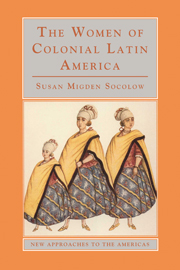Book contents
- Frontmatter
- Contents
- List of Illustrations
- Acknowledgments
- Introduction: Why Women?
- 1 Iberian Women in the Old World and the New
- 2 Before Columbus: Women in Indigenous America and Africa
- 3 Conquest and Colonization
- 4 The Arrival of Iberian Women
- 5 Women, Marriage, and Family
- 6 Elite Women
- 7 The Brides of Christ and Other Religious Women
- 8 Women and Work
- 9 Women and Slavery
- 10 Women and Social Deviance: Crime, Witchcraft, and Rebellion
- 11 Women and Enlightenment Reform
- Conclusion
- Documents
- Suggested Further Reading
- Index
- Plate section
11 - Women and Enlightenment Reform
Published online by Cambridge University Press: 05 June 2012
- Frontmatter
- Contents
- List of Illustrations
- Acknowledgments
- Introduction: Why Women?
- 1 Iberian Women in the Old World and the New
- 2 Before Columbus: Women in Indigenous America and Africa
- 3 Conquest and Colonization
- 4 The Arrival of Iberian Women
- 5 Women, Marriage, and Family
- 6 Elite Women
- 7 The Brides of Christ and Other Religious Women
- 8 Women and Work
- 9 Women and Slavery
- 10 Women and Social Deviance: Crime, Witchcraft, and Rebellion
- 11 Women and Enlightenment Reform
- Conclusion
- Documents
- Suggested Further Reading
- Index
- Plate section
Summary
From the youngest age all [the women of Buenos Aires] are instructed in the essential principles of our wonderful religion; and joining the endowments of their spirit with those of their heart, the ease of learning with the dedication to know more everyday through a wise education, they make such rapid progress that they possess, not only the principles of their native language, but they also know how to create, read, and write with admirable dominion, exactitude and correctness. And in addition to dogma, the mysteries, and the basic tenets of Christian morality, some of them repeat the most well known passages of both Testaments, [as well as] the history, progress, and actual state of our religion. Some know how to discuss the climate, government, religion, laws, character, and customs of many European nations; and there are even some who have been instructed in French and English and can produce a moderate translation.
The eighteenth century, first in the Iberian Peninsula and then in Latin America, was a century of reform. Influenced by the French philosophes, a new generation of Spanish and Latin American writers began to spread innovative ideas about the nature of knowledge, rational thinking, and economic advancement. At the same time Iberian governments moved to tighten their control over the inhabitants of the colonies and, in the case of Spanish America, to regulate what they viewed to be social disorder.
- Type
- Chapter
- Information
- The Women of Colonial Latin America , pp. 165 - 177Publisher: Cambridge University PressPrint publication year: 2000

